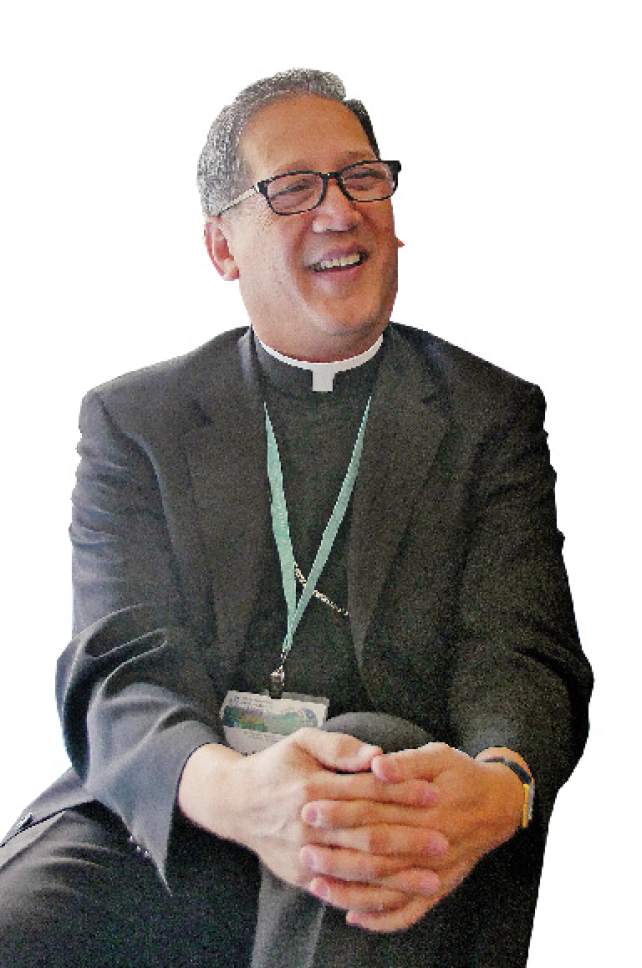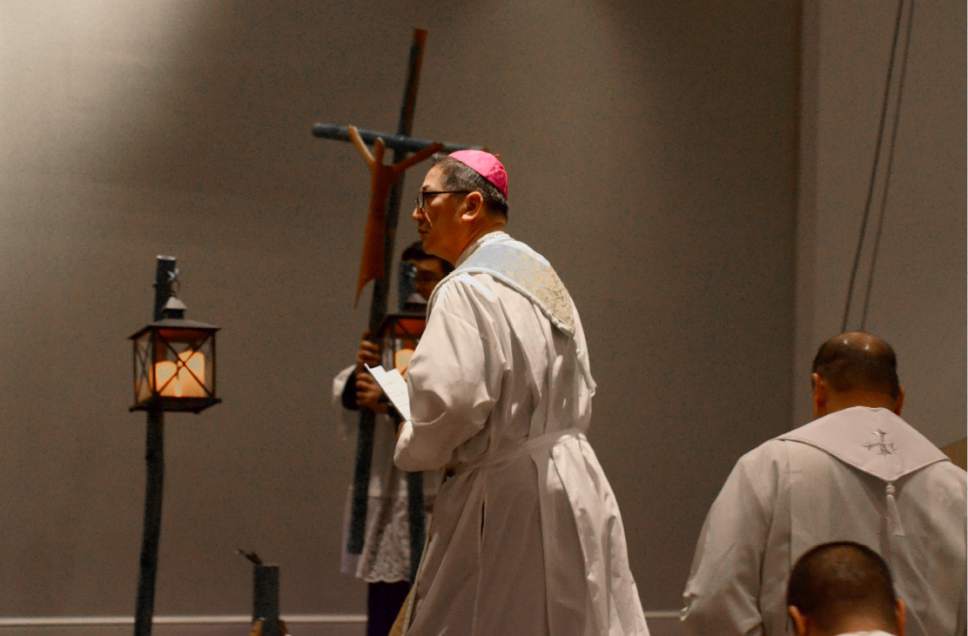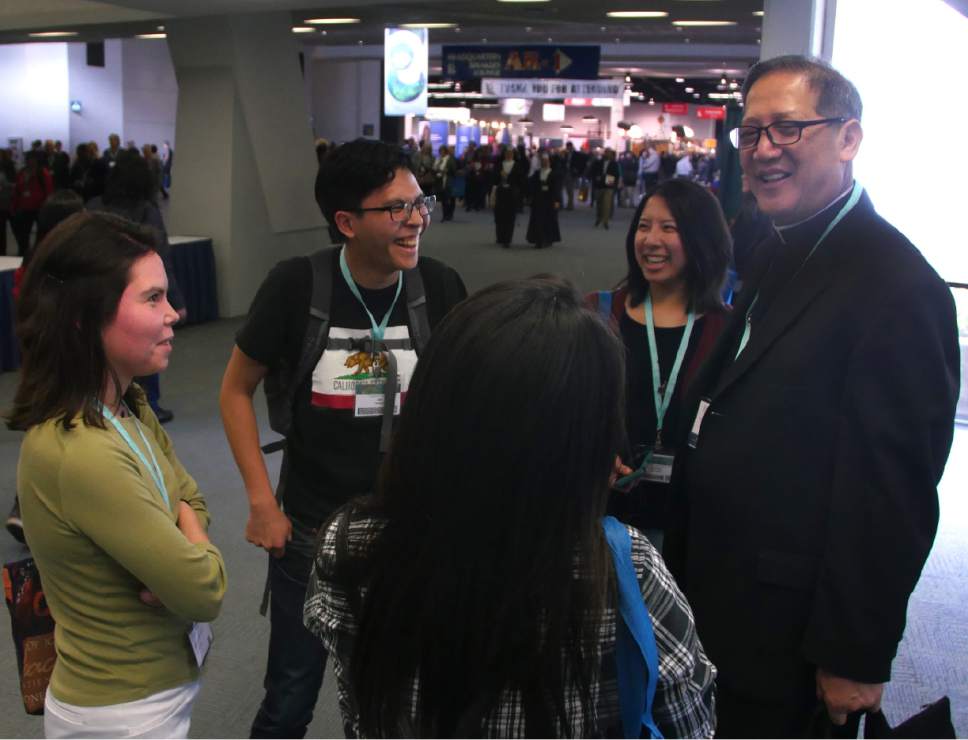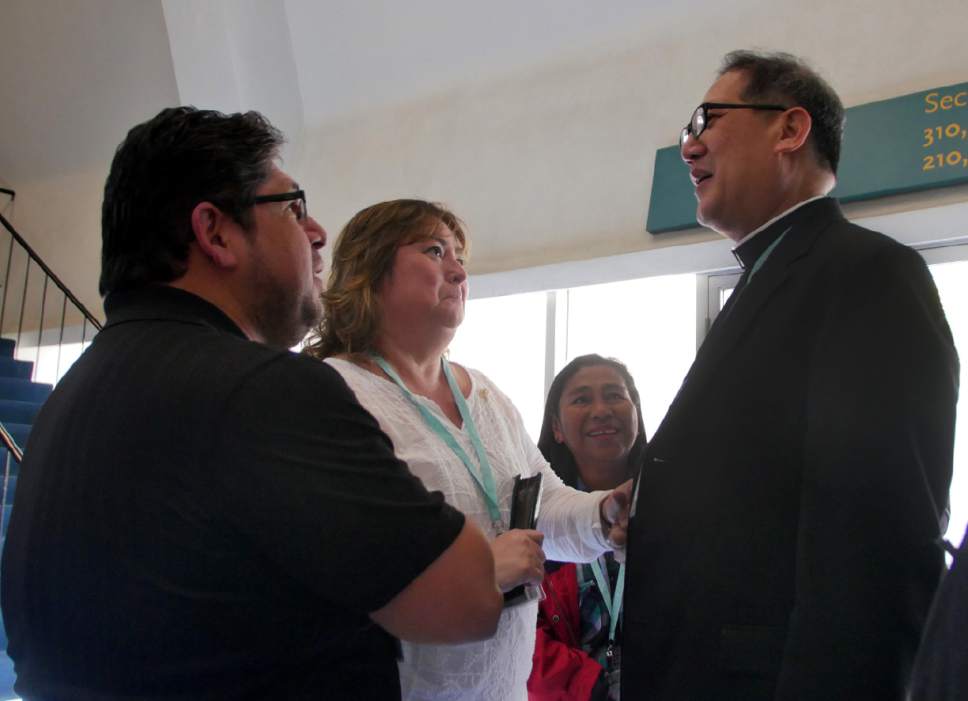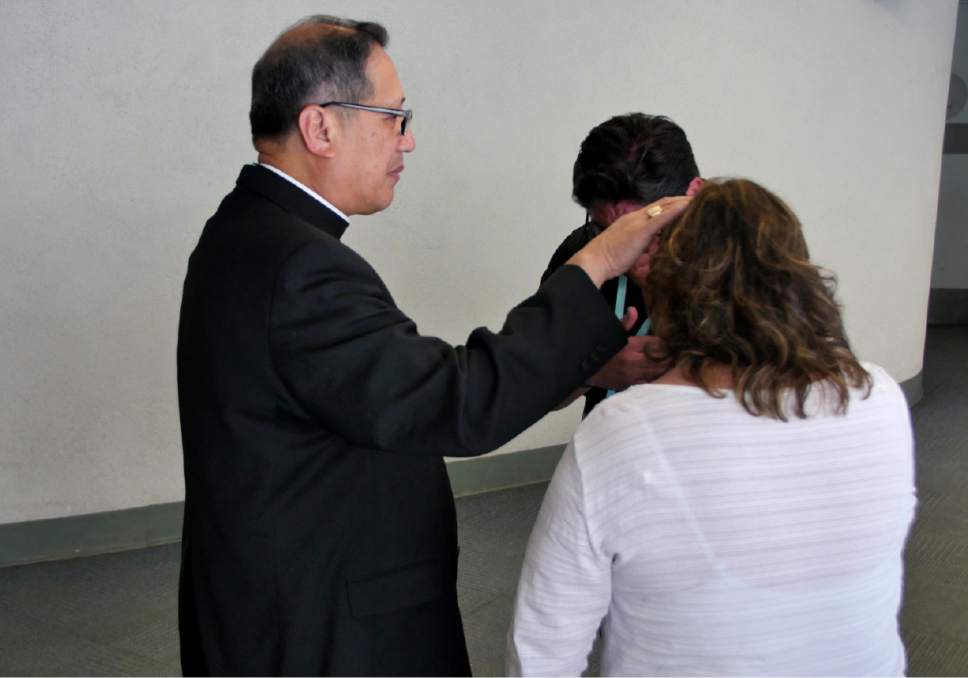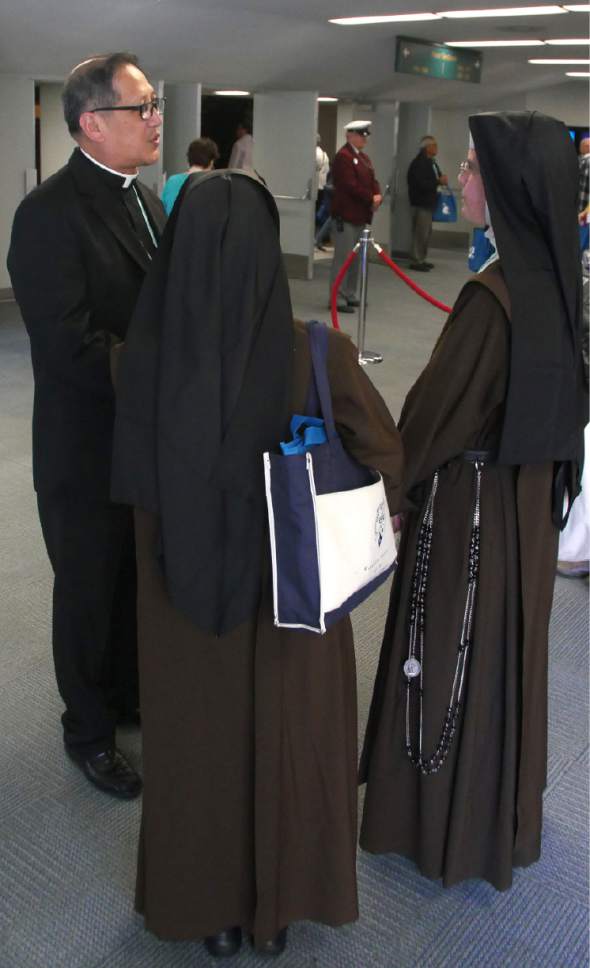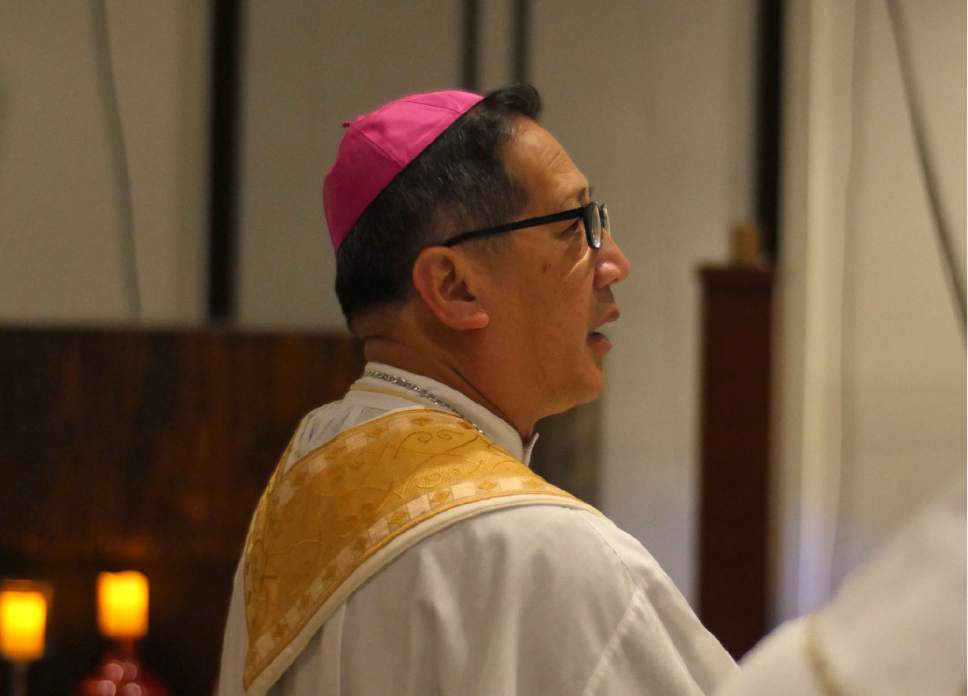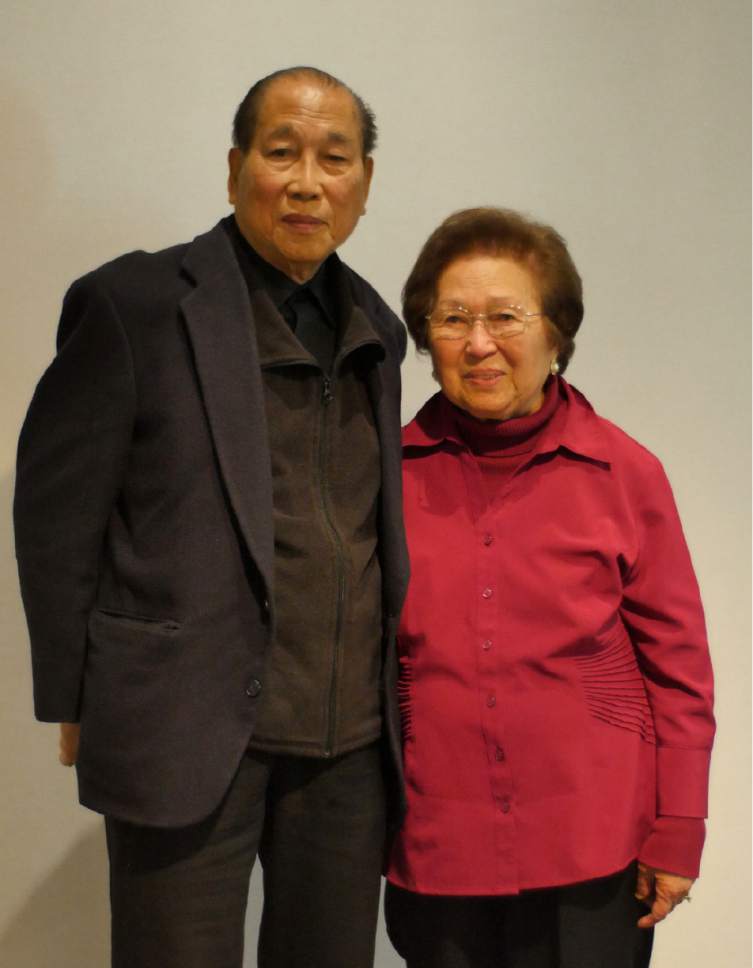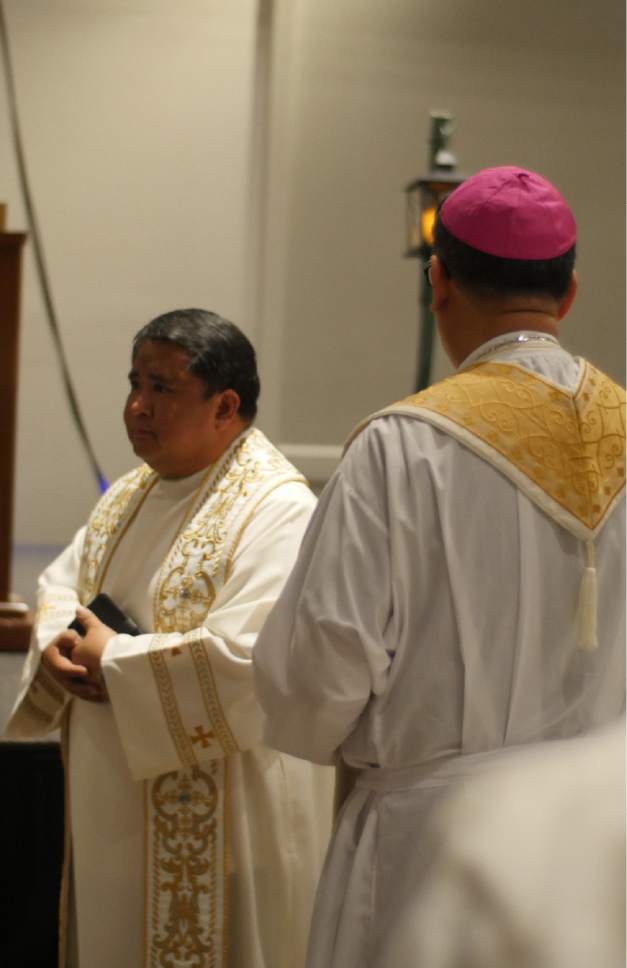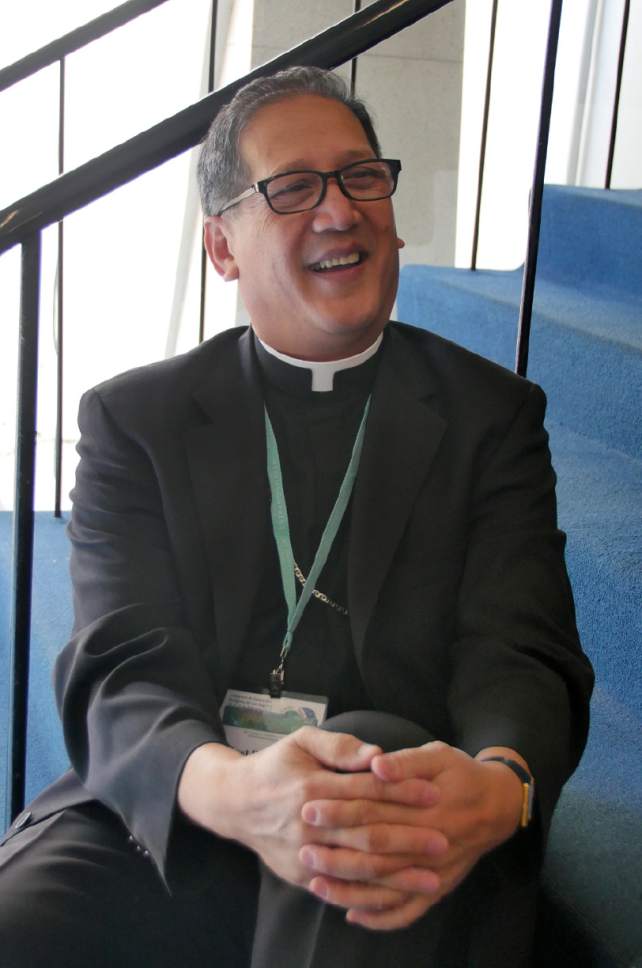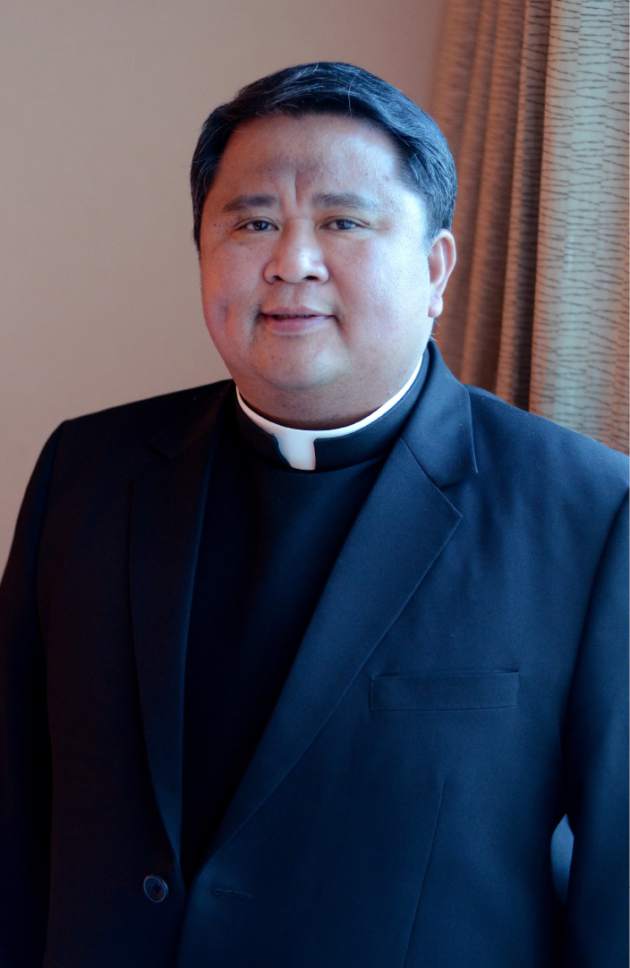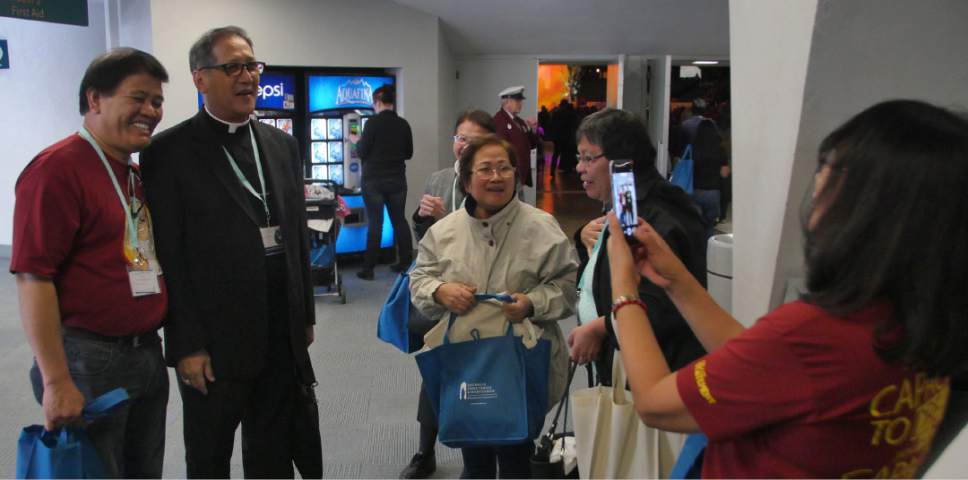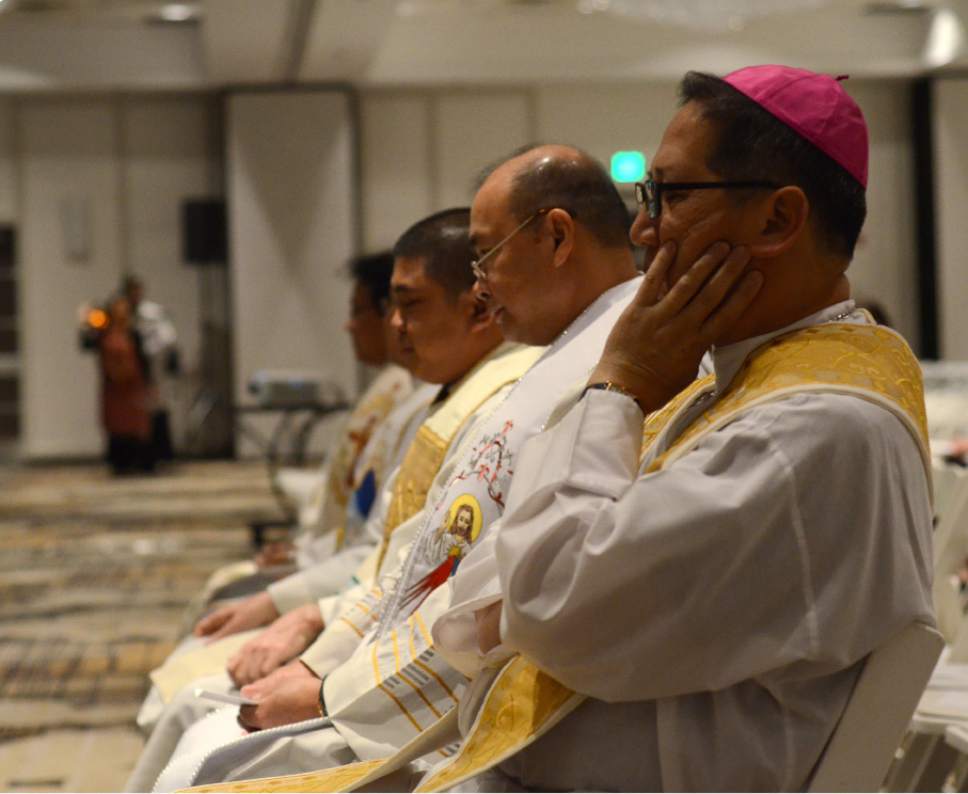This is an archived article that was published on sltrib.com in 2017, and information in the article may be outdated. It is provided only for personal research purposes and may not be reprinted.
Anaheim, Calif • Make no mistake — Utah Catholics got the right Oscar. And what a win it was for a minority faith in the heartland of Mormonism.
By all accounts, Los Angeles Auxiliary Bishop Oscar Azarcon Solis, who will be installed Tuesday as the 10th bishop of the Salt Lake City diocese, is a religious rock star.
He was the first Filipino bishop ordained in the U.S. and has become off-the-charts popular in La La Land. If you don't believe it, just watch him stroll through the giant Anaheim Convention Center, swarming with 30,000 Catholics during the just-completed Religious Education Congress. Every few feet, an adoring fan stops him to ask for a hug, a blessing, a photo.
Teens, older folks, deacons, nuns, couples, Eucharistic Ministers, fellow priests and lay members all want a piece of him like Star Trek's William Shatner at Comic Con — but for free. As Solis chats with each one, the multilingual cleric moves seamlessly from English to Spanish to (Filipino) Tagalog, leaving every group with a farewell grin.
Back home in the Philippines, the affable bishop dines with dignitaries and putts with presidents.
Yet Utah's bishop-elect carries his celebrity status lightly. Playful and personable, he does not demand deference but rather charms his listeners with self-deprecating humor, pop-culture allusions and profound God-soaked sermons.
He is equally at home playing Josh Groban's "You Raise Me Up" at a piano bar as behind a pulpit, quoting scripture.
Because he served in an Italian/Cuban parish in New Jersey, a French/Creole parish in Louisiana, and the polyglot parishes of Southern California, people often ask what kind of accent he has.
To that, Solis quips, "I can't even understand myself now."
Clearly, the Filipino-American bishop embodies the faith's future. He moves beyond the Vatican II administrative style of his predecessors: Utah's former Bishop George H. Niederauer, a witty, urbane leader at ease in the company of priests, and Bishop John C. Wester, an ardent advocate-organizer and now archbishop of Santa Fe.
The Filipino bishop has had a completely different trajectory, growing up in a 90 percent Catholic country, then discovering firsthand what it means to be an American outsider. He witnessed the faith's abuse crisis as it exploded in a parish he served, and has lived in both the Northeast, where Catholicism has dramatically declined, and in the West, where it has consistently climbed.
Solis also is the only one of the three Utah bishops who spent much hands-on time laboring in a parish. That makes him the picture of what Pope Francis is looking for — shepherds who smell like their sheep.
Yet, the disarming Solis says with a shrug, no part of this journey was his idea. Each time he mentioned a desire for a sabbatical, he got a divine nudge — push, actually — in a completely unexpected direction.
"God," he says, is "a God of surprises."
—
A church cocoon • Catholicism came to the Philippines in 1521, when explorer Magellan "discovered" the island nations — and it was shortly thereafter colonized by Spain. After nearly five centuries, church and culture became nearly synonymous.
Filipinos practice "the same devotions," says Rocco Palmo, editor of Whispers in the Loggia, a Catholic news blog, but "with an Asian energy that puts them on steroids."
That world nurtured Oscar from birth in San Jose until his ordination there in 1979. Born of devoted Catholic parents, he was reared in the faith along with six siblings. All attended Catholic schools.
When young Oscar was in the third grade, however, tragedy struck. A younger brother drowned. Some years later, another brother was stabbed to death in Manila. (In recent years, a sister died as well.)
His mother eventually gave birth to her last son, Ronald, who is 13 years younger than Oscar and worked as an architect before switching to the priesthood and being ordained in 1996.
His brother is "very religious and prayerful," Solis says. "He's the reliable one; I am the wild man. He's the prince; I am the [church's] pauper."
At 11, Solis entered a Catholic seminary in his hometown but had not yet decided to be a priest.
"When a teacher asked, 'Who wants to be a doctor?' I raised my hand. 'Who wants to be a lawyer?' I raised my hand, " he recalls, laughing. "'Who wants to be an engineer?' I raised my hand."
But living in that environment, observing the priests as they fulfilled their responsibilities, earned respect and showed kindness, the notion of adopting that same role began to take hold.
As an unusually tall Filipino, Solis played basketball in high school, also tennis. It was the 1970s, so he grew his hair long, and played hits by Bob Dylan and James Taylor on the piano and guitar.
He enjoyed works by famed German philosopher Gottfried Leibniz, noted for his optimism, and "The Little Prince," whose most well-known saying he quotes from memory: "One sees clearly only with the heart. The essential is invisible to the eye."
Within a few years of graduating from high school, Solis had earned a college degree in philosophy with a minor in English, Spanish, Greek and Latin. He then returned to his seminary to teach philosophy, became dean of students and rector — all before age 25.
It was a grueling schedule.
After five years, Solis asked his bishop if he could have a sabbatical to study Buddhism, Hinduism and Shintoism. He got the OK to go to Rome for a "study break," on the assumption the young priest would return.
It was 1984 and Solis opted first to visit his sister in the Bay Area, and then travel south to the City of Angels for the Summer Olympics. Once again, God intervened.
—
North and south • While Solis was staying briefly in L.A., a Filipino priest invited the visitor to work in his New Jersey parish.
"When?" the newcomer asked. "Tomorrow" was the reply.
Within days, Solis found himself ensconced in a working-class Italian/Cuban parish in North Jersey, home to the nation's largest Cuban population outside of Florida.
Some 18 blocks of Union City were dubbed "Little Havana," the bishop says. "Even the Chinese had to learn their language."
On his second weekend in town, the senior priest asked Solis to read part of the liturgy for a Spanish Mass. He obliged, stumbling over some words and pronunciations. Apparently, it was good enough for his mentor, who informed Solis he was leaving for a month.
That was Solis' "baptism" working in a parish, he says. "The pastor treated me like a brother."
When the collection plate didn't cover all the congregation's expenses, he sold Bingo cards. He honed his Spanish skills. He learned city life and lingo. He laughed, cried, mourned and grew with the people.
Then, in 1988, and still on a tourist visa (he would gain U.S. citizenship a decade later), Solis transferred to a Louisiana parish, sandwiched between New Orleans and Baton Rouge.
The Diocese of Houma-Thibodaux is "a mix of rural and small city, its economy driven by oil and gas exploration, production and support, along with fishing, shrimping and some agriculture," writes retired religion reporter Bruce Nolan from New Orleans' Times-Picayune. "It's culturally deeply Catholic."
That's where Solis practiced Cajun French and ate shrimp and crawfish.
"I wore fishermen's boots as I washed down the church patio," he tells the Asian Journal of Los Angeles. "I became one with and part of [the diocese.]"
It was also next door to the Lafayette diocese, which Nolan describes as "ground zero for the abuse scandal ... almost 10 years before the earthquake that Boston triggered in 2002."
A priest in Solis' diocese, the journalist notes, was tried and convicted for sexually abusing a minor, attracting widespread publicity.
"It was a sad moment in the life of the church," Utah's future bishop says now. "You felt the pain of the victims and down on your fellow priests. We made mistakes, but it forced us to listen."
Independent studies prompted the U.S. church to adopt "zero tolerance" safeguards, he says, including background checks and fingerprinting.
The church still is learning, Solis says, and trying to bring something good out of a horrific experience for victims.
Solis stayed in the bayou until 2004, when another bolt came from beyond — a call to be auxiliary bishop in Los Angeles.
—
Plunging into the deep • Moving from a relatively small region to the nation's largest archdiocese, Solis tells friends, was like transferring from "a fishbowl to the ocean."
It is home to more than 5 millions Catholics, 75 percent of whom are Hispanic, including close to a million undocumented immigrants.
The bishop loved to tell about a Latino kid who heard him say, "I'm Filipino." The youngster walked away believing the new leader was Mexican, recounts the Rev. Alex Aclan, vicar for clergy there, "because he introduced himself as 'jalapeño.' "
Solis is a "major ingredient in the glue that has bonded the Filipino priests together," Aclan says. When he is present at gatherings, it draws more Filipino priests.
Solis was instrumental in creating the National Association of Filipino Priests-USA, a group that keeps growing. "This would not have been possible," Aclan says, without Solis' leadership.
More than 3,000 well-wishers — including hundreds from Louisiana — squeezed into newly constructed Our Lady of the Angels Cathedral for Solis' 2004 ordination as auxiliary bishop, the first in that sacred space.
Rick and Dely Villanueva were among them, but couldn't get close enough to speak to the man of the hour.
Within a month, though, the recently retired Rick Villanueva took himself to Solis' office and offered his full-time services, saying he would do anything.
Turns out, what Solis, who oversaw the archdiocese's ethnic ministries, needed most was a driver who could navigate the city's insane traffic — and the former accountant proved perfect.
They visited some 200 churches across the valley, with Villanueva doing his best to get the bishop to places on time — and to remind him to eat and not say yes to every photo and to get some rest. He knows the route to the hospitals, parishes and all the restaurants that are open late (though Solis often eats YMCA — "yesterday's meal cooked again").
Even when it seems impossible, says Dely Villanueva, the driver's Filipino wife, "he'll find a way to satisfy people."
Quite a feat, given that his assistant, Angelic Nuñez, says the bishop was often "overbooked."
When Catholics occasionally showed up at the office looking for help or someone to talk to, she says, "he would take the time to listen to them ... [and] give them food from his pantry and give them money."
Solis is routinely even-tempered, attest Nuñez and others, and never raises his voice or gets testy.
Even on the golf course.
"If he misses a shot, he might say, 'su-gar,' " says the Rev. Albert Avenido, a fellow Filipino and regular golfing buddy. "But he never gets angry, even though I have aggravated him many times."
Before Solis, Father Albert, as he is known, was not a golfer. In the Philippines, golf is not for priests, he says, "it's a lifestyle of the rich and famous — and one I would not learn."
But the good-natured bishop gave his pal a set of clubs, some videos and three months to learn. Avenido spent hours practicing in his room while the "very, very patient" bishop waited.
Now they play together each Thursday.
To see Solis on the course — even with parties who want to play through — is to know how he is with everyone. A peacemaker.
When organizers were working on an annual "Migration Day" event, critics complained that African-Americans were not migrants and neither were American Indians.
The bishop's advice? Change the name to "Celebration of Culture."
Problem solved.
"It's really a gift," Avenido says, "God has given him."
—
Back to the fishbowl • On Jan. 10, the day that Solis' appointment as Salt Lake City's next bishop was announced, more than a million Filipinos took to the streets of Manila in an annual ritual to try to touch the Black Nazarene, a dark wooden cross rescued from a burning church. It is believed by many to have supernatural powers to heal.
The bishop-elect may need such powers as he copes with the Beehive State's ice and snow (L.A. bishops gifted him a parka, skis and an Apple watch, the Catholic newspaper reports, "so he can have a warm conversation with Siri on the way to the [far-flung] churches" that crisscross the state's 85,000 square miles.
He's evolving, he jokes, from a Roman bishop to a "roaming bishop."
After Solis gets acclimatized to Utah's weather and challenges, his friends say, the new bishop may inaugurate the state's first Simbang Gabi, a traditional Filipino night Mass nine days before Christmas.
After all, there are about 15,000 Asians and Pacific Islanders among Utah's 300,000-plus Catholics — and the ritual may appeal even to the diocese's Latino, Anglo, Vietnamese, Polish and even Arabic believers.
Through all this busyness, has the Filipino leader ever experienced the absence of God, a dark night of the soul as described by the saintly Mother Teresa?
Every now and then, in the quiet of the evening, the clergyman says, he asks himself, "Is this my life?"
In those low moments, Solis says, he digs deep into his heart for God's grace and looks to fellow followers who have "nourished and sustained" him.
Once more, a divine intervention has taken him to a new place — with unfamiliar faces, fears and frustrations.
It's goodbye, La La Land, and hello, Zion.
pstack@sltrib.com Twitter: @religiongal About Bishop Oscar A. Solis
Born • Oct. 13, 1953, in San Jose City, Philippines
Education • Divine Word Seminary, Tagaytay City, Philippines; University of Santo Tomas, Manila
Ordained a priest • April 28, 1979, in the Archdiocese of Manila
Assignments • Diocese of Cabanatuan, Philippines; Archdiocese of Newark, N.J.; Diocese of Houma-Thibodaux, Louisiana
Ordained auxiliary bishop • Feb. 10, 2004, for Archdiocese of Los Angeles —
Utah's Catholic bishops
Lawrence Scanlan, 1886-1915
Joseph S. Glass, 1916-1926
John J. Mitty, 1926-1932
James E. Kearney, 1932-1937
Duane G. Hunt, 1937-1960
Joseph L. Federal, 1960-1980
William K. Weigand, 1980-1993
George H. Niederauer, 1994-2005
John C. Wester, 2007-2015
Oscar A. Solis, 2017-
Source: Salt Lake Tribune archives —
The installation ceremony
Oscar Solis will be installed as 10th bishop of the Diocese of Salt Lake City on Tuesday at 2 p.m. in the landmark Cathedral of the Madeleine, 331 E. South Temple. No tickets remain for the event. A public reception will follow from 6 to 8 p.m. at the Salt Lake City Marriott Downtown at City Creek, 75 S. West Temple. On Monday, Solemn Vespers will take place at 7 p.m. at the cathedral and will include the incoming bishop's ritual door-knocking.


